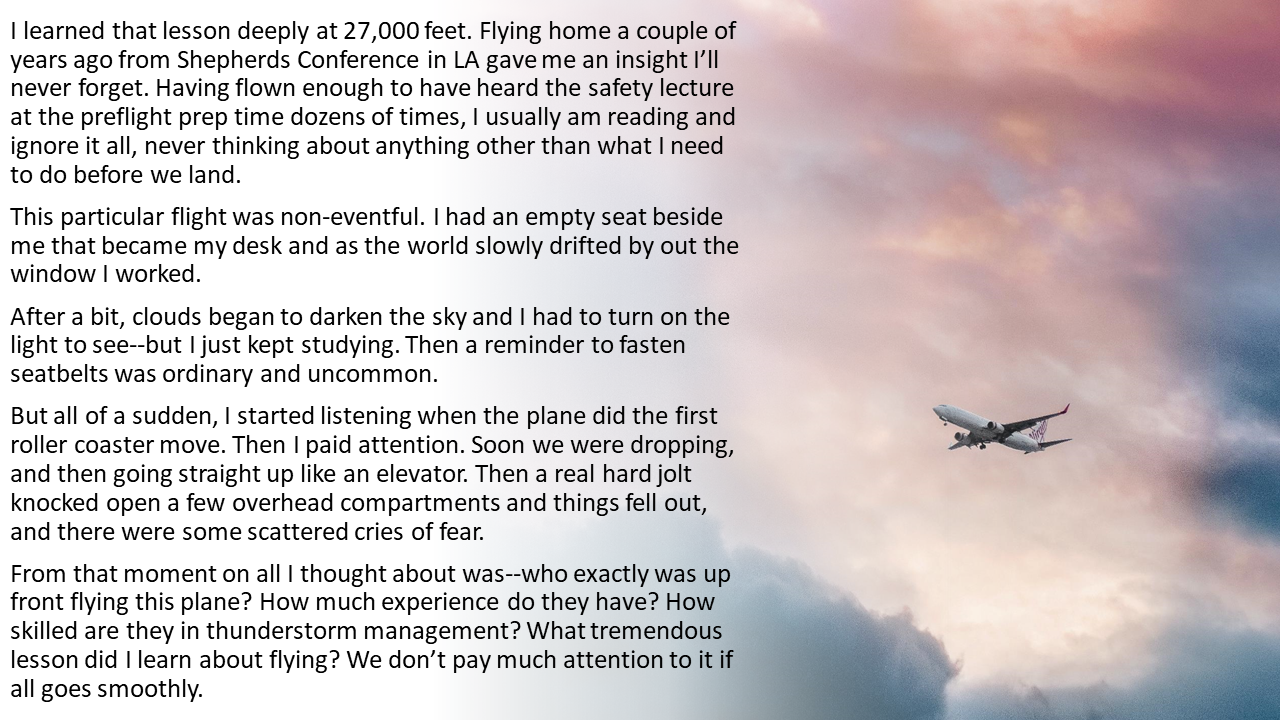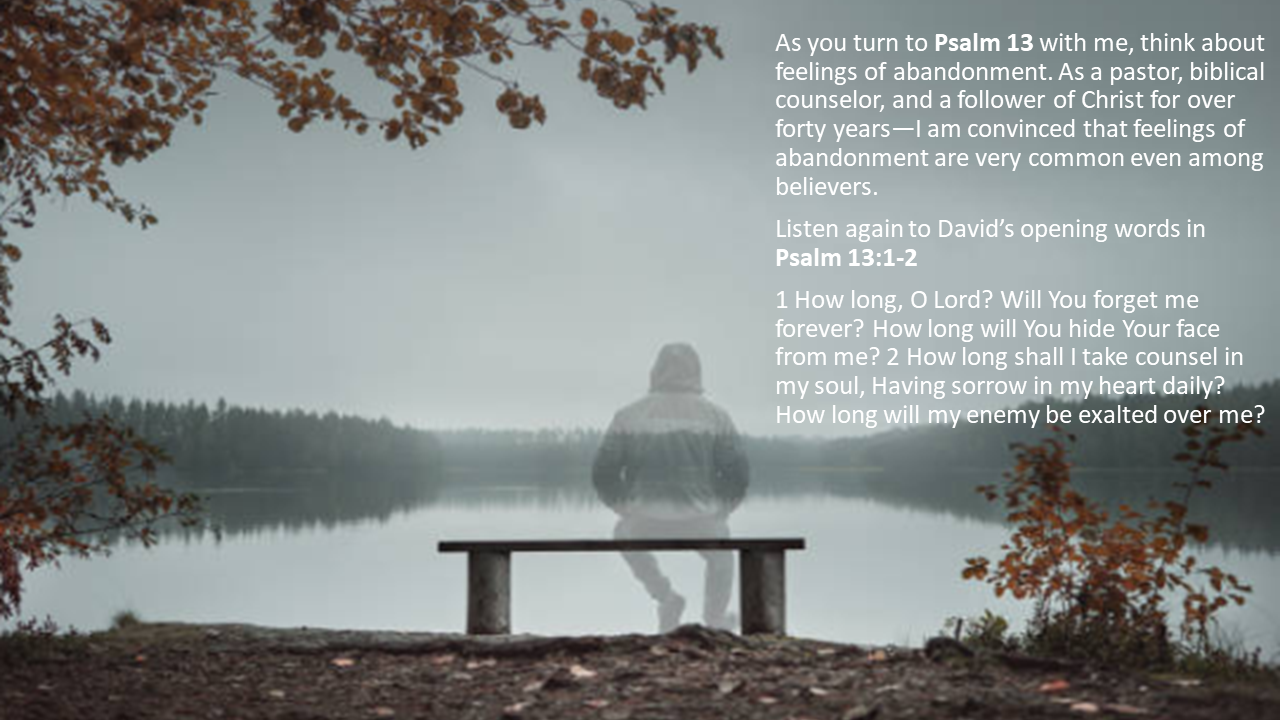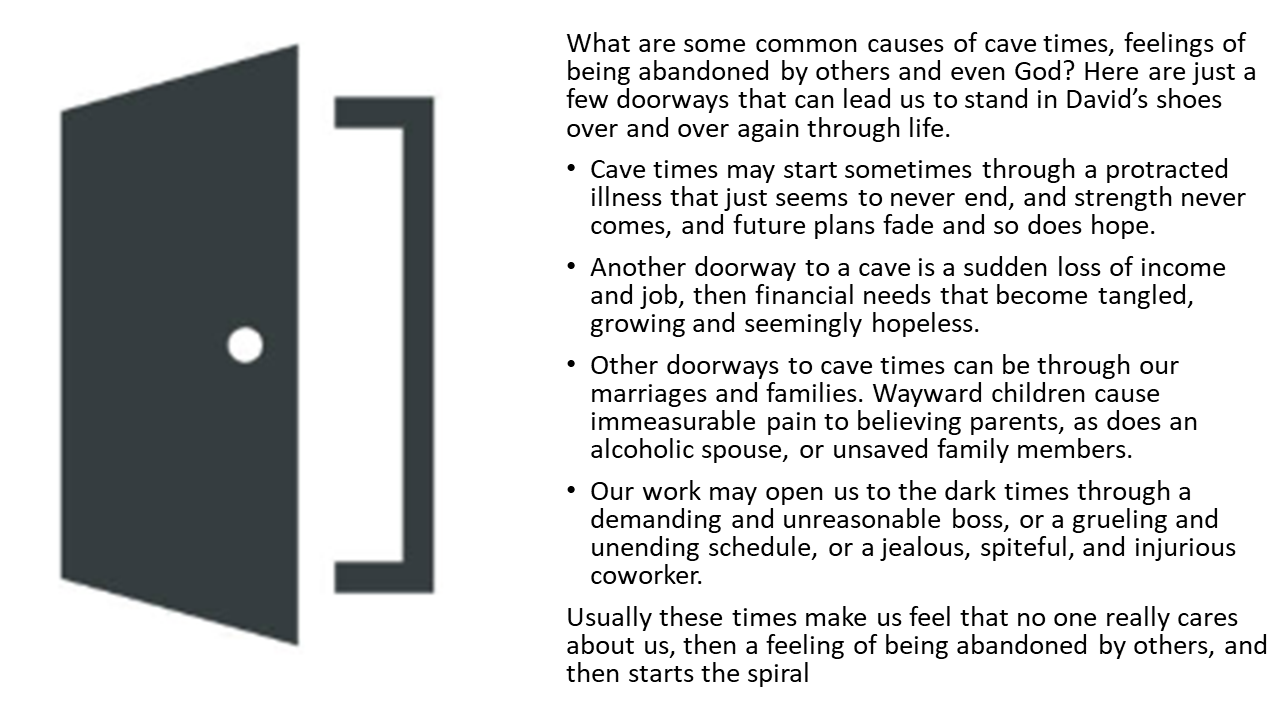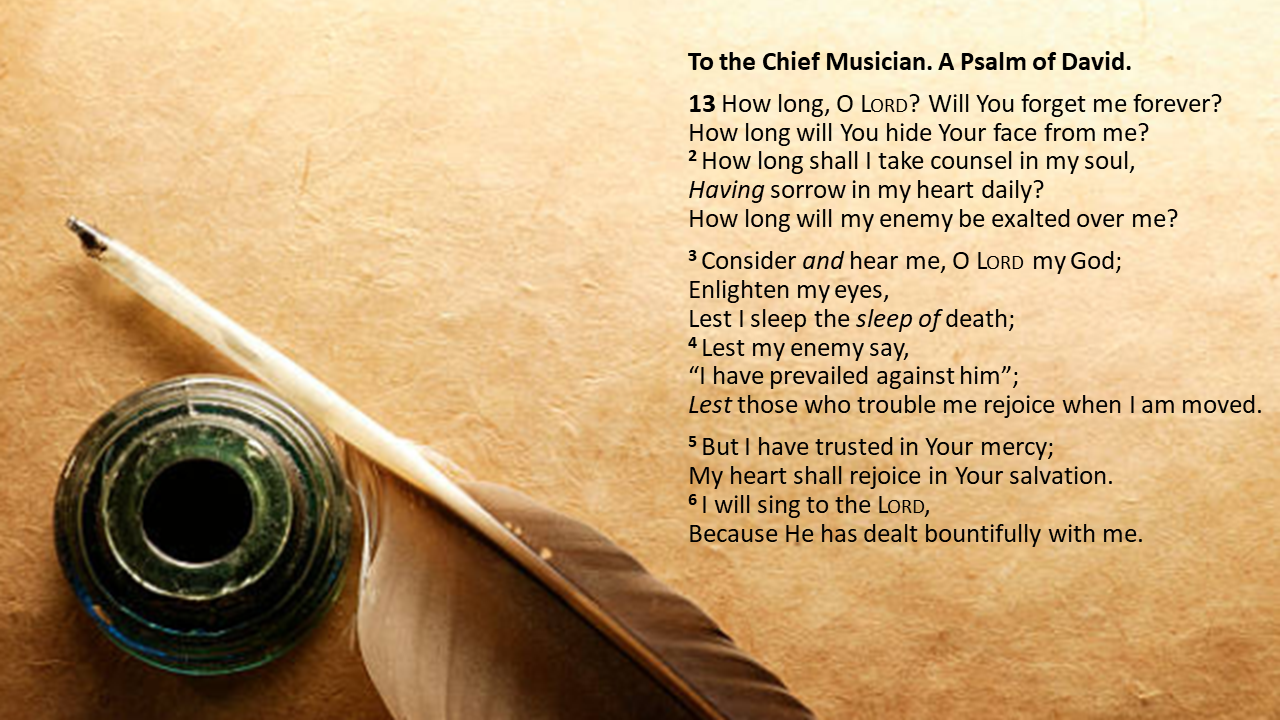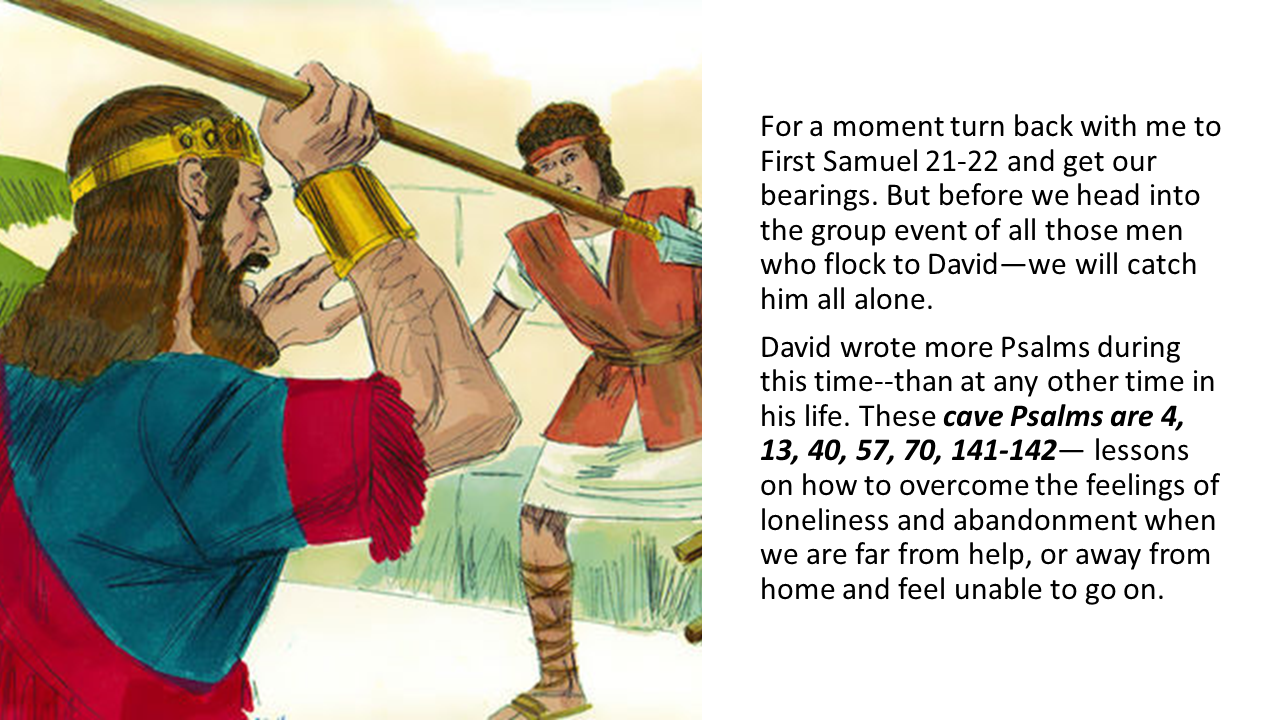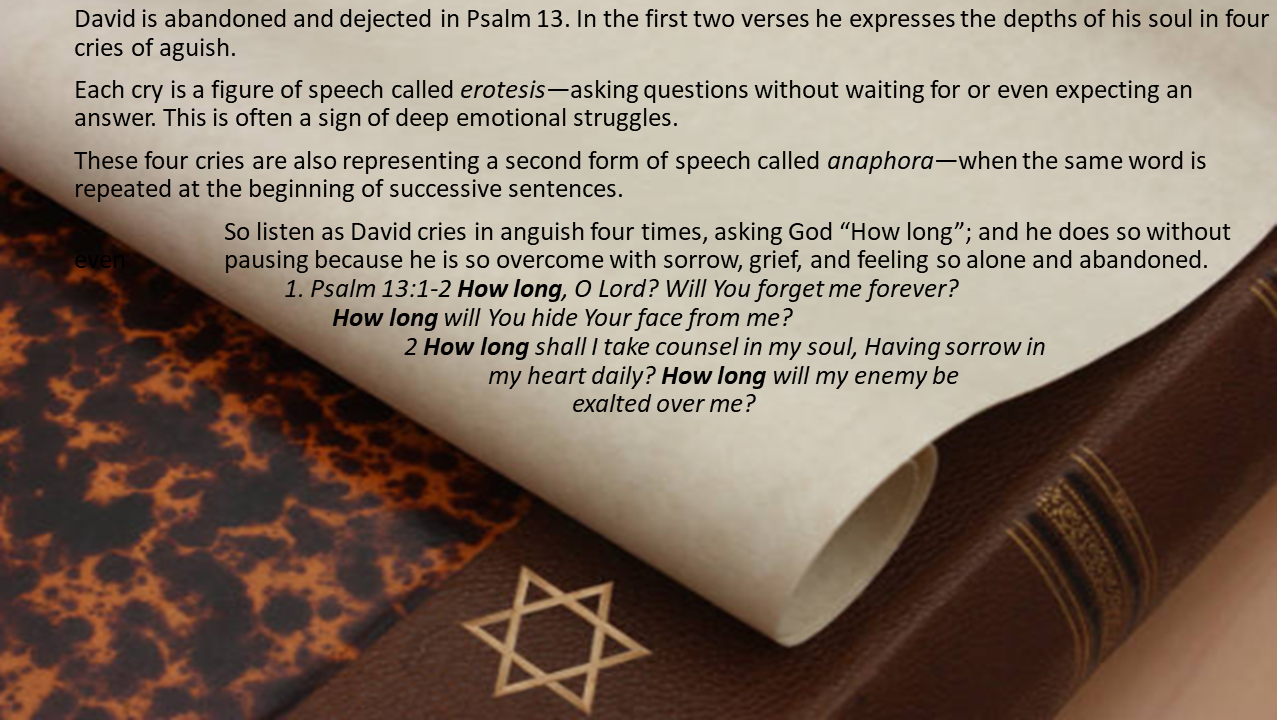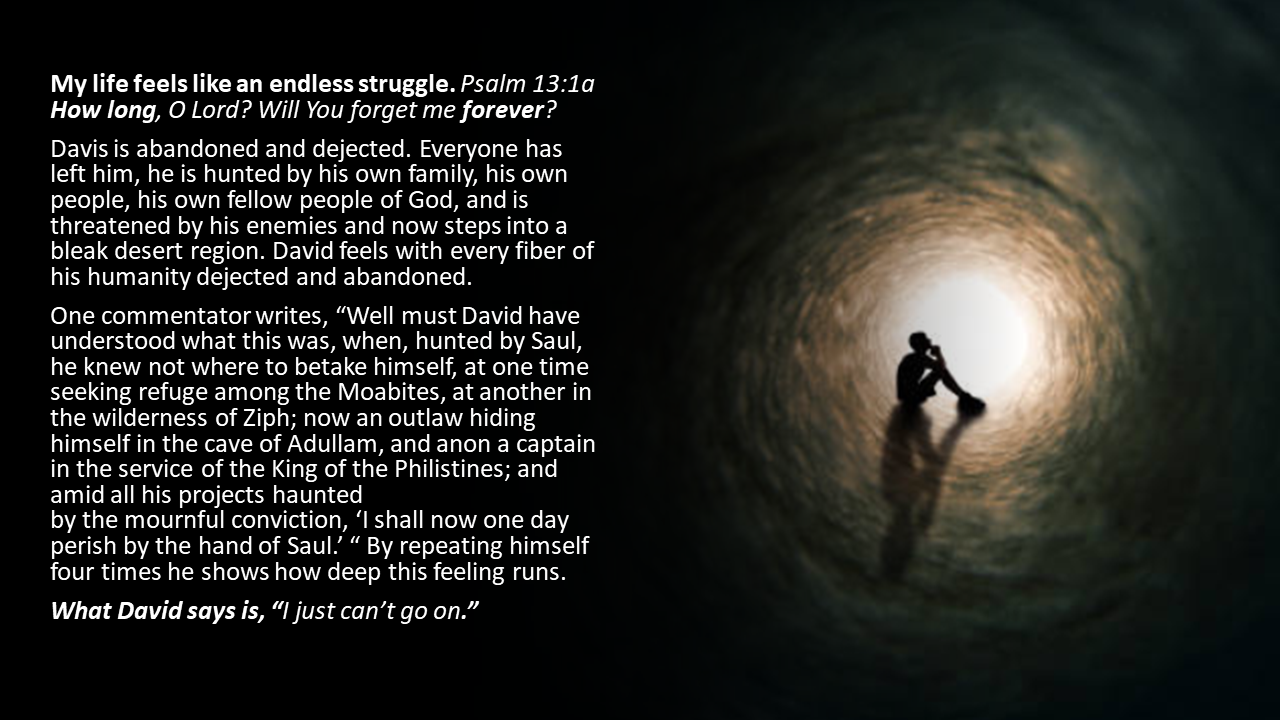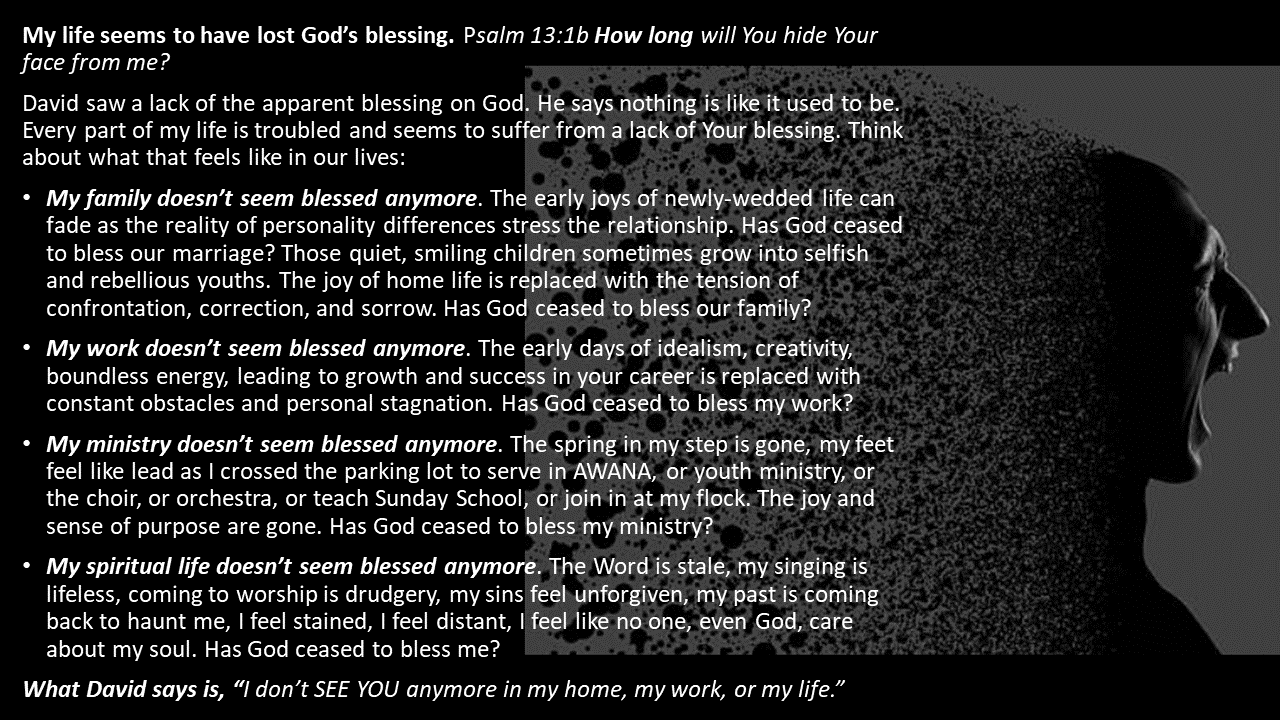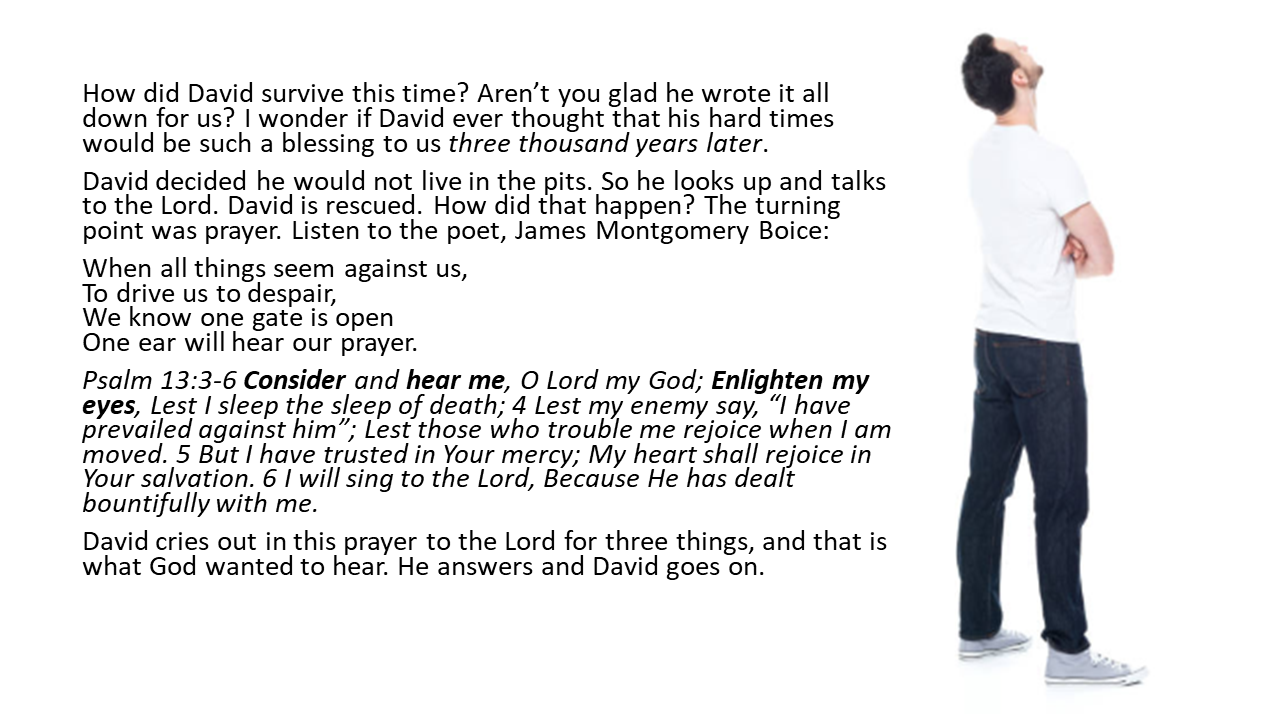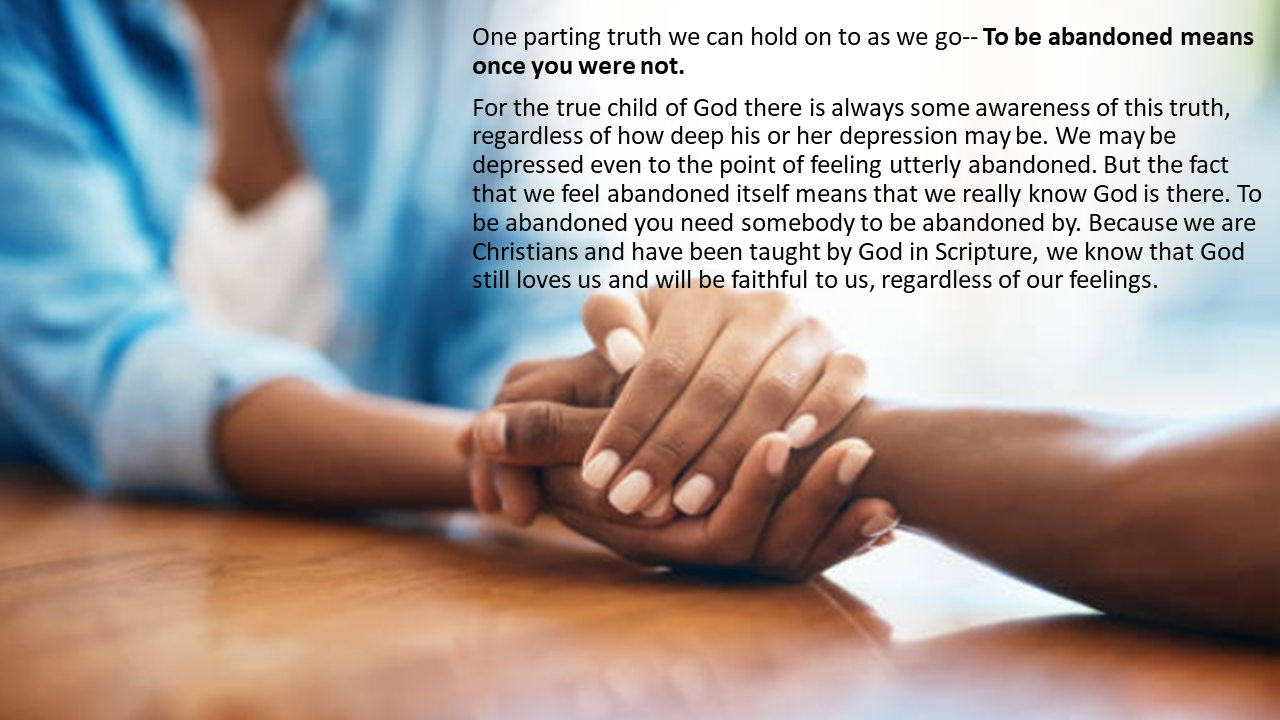If the YouTube video above is not available, here are two other ways to view:
A Refuge for the Abandoned
050814AM
COR-12 LHC-09
Psalm 13
A Refuge for the Abandoned
Everything was going so well for so long—Goliath, worship leader for the king, warrior, king’s cabinet, king’s son-in-law and then everything fell apart! Christ is our Refuge—but not if we can’t see His open arms.
Sometimes, in the lives of some believers, there comes a point so low that we actually feel that everyone—even God, has abandoned us. That is where we find David in Psalm 13. Let’s open there this morning.
We are right in the middle of our look at Christ Our Refuge. In Psalm 13 we will see that Christ can’t be our refuge if we don’t hear His invitation to flee to Him. Christ can’t be our Refuge if we don’t even remember He is there. And sometimes we have to hit bottom, or go through dark waters, or face incredible convulsions in our lives to see Him—even though He’s been there all the time.
 I learned that lesson deeply at 27,000 feet. Flying home a couple of years ago from Shepherds Conference in LA gave me an insight I’ll never forget. Having flown enough to have heard the safety lecture at the preflight prep time dozens of times, I usually am reading and ignore it all, never thinking about anything other than what I need to do before we land.
I learned that lesson deeply at 27,000 feet. Flying home a couple of years ago from Shepherds Conference in LA gave me an insight I’ll never forget. Having flown enough to have heard the safety lecture at the preflight prep time dozens of times, I usually am reading and ignore it all, never thinking about anything other than what I need to do before we land.
This particular flight was non-eventful. I had an empty seat beside me that became my desk and as the world slowly drifted by out the window I worked.
After a bit, clouds began to darken the sky and I had to turn on the light to see–but I just kept studying.
Then a reminder to fasten seatbelts was ordinary and uncommon.
But all of a sudden I started listening when the plane did the first roller
coaster move. Then I paid attention. Soon we were dropping, and then going straight up like an elevator. Then a real hard jolt knocked open a few overhead compartments and things fell out, and there were some scattered cries of fear.
From that moment on all I thought about was–who exactly was up front flying this plane? How much experience do they have? How skilled are they in thunderstorm management? What tremendous lesson did I learn about flying? We don’t pay much attention to it if all goes smoothly.
Who ever even thinks about the pilot until the weather gets rough? Until the world around us jolts, jumps, rocks and swerves—then all of a sudden that is all we think about. Who is steering this careening machine? Suddenly we realize how important the pilot really is, and that our life is in their hands.
The same is true in life. The fewer bumps, the more we ignore the pilot. The smoother the ride, the more we forget the one in whose Hands is our life. But let the rough family times come, the roller coaster ride of our emotions, the crash of our finances, or the sudden plummet of our health—then we think about the pilot.
As we continue in our Christ Our Refuge Series, we are looking at loneliness. We are tracking David’s life recorded in the Scriptures and matching up the Psalms he wrote from each event. This allows us to see all the ways he experienced loneliness and how the Lord rescued him from all his troubles.
This morning we look at one of David’s deepest trials. We are past the terrible situation in Gath before Achish the king that we saw last time in Psalm 34. Remember how David was so alone and afraid that he acted crazy? After the Lord rescued him from Gath, David flees to the wilderness and goes to live in a cave.
During this cave experience—David goes through a time a feeling abandoned by God. But in that dark hour he finds hope. Why? Because as we keep seeing in God’s Word —troubles, trials, tests, and temptations always pushed David towards the Lord. God was his choice, God was his habit, God was his desire because–David supremely loved the Lord with all his heart. These dark times just surfaced the reality that down deep in his soul–David had entrusted
his life to the Lord.
That is exactly the way life was for David—the more his life was shaken, the more he thought about and entrusted his life to the Lord. The Psalms we open this morning are David’s confessions about who was flying his plane through the turbulent and stormy skies of his life— even when he felt abandoned he found that God was still there flying him through life.
As you turn to Psalm 13 with me, think about feelings of abandonment. As a pastor, biblical counselor, and a follower of Christ for over forty years—I am convinced that feelings of abandonment are very common even among believers.
 Listen again to David’s opening words in Psalm 13:1-2
Listen again to David’s opening words in Psalm 13:1-2
1 How long, O Lord? Will You forget me forever? How long will You hide Your face from me? 2 How long shall I take counsel in my soul, Having sorrow in my heart daily? How long will my enemy be exalted over me?
What are some common causes of cave times, feelings of being abandoned by others and even God? Here are just a few doorways that can lead us to stand in David’s shoes over and over again through life.
• Cave times may start sometimes through a protracted illness that just seems to never end, and strength never comes, and future plans fade and so does hope.
• Another doorway to a cave is a sudden loss of income and job, then financial needs that become tangled, growing and seemingly hopeless.
• Other doorways to cave times can be through our marriages and families. Wayward children cause immeasurable pain to believing parents, as does an alcoholic spouse, or unsaved family members.
• Our work may open us to the dark times through a demanding and unreasonable boss, or a grueling and unending schedule, or a jealous, spiteful, and injurious coworker.
Usually these times make us feel that no one really cares about us, then a feeling of being abandoned by others, and then starts the spiral downward into thinking that God has also abandoned us.
As we examine Psalm 13 closely, David take us through his depths. David feels abandoned—so abandoned that he cries out as if he is not going to make it.
Amazingly there is little said or written in Christian literature about helping believers who feel abandoned by God. Even the classic work by D. Martin Lloyd Jones called Spiritual Depression: Its Causes and Cures doesn’t even cover this topic.1
“Why do you suppose this is? I think it is because we have been taught that Christians are not to experience such things, that we are only to have “life more abundantly” or to “live victoriously.” … The dying French atheist Voltaire…said, “I am abandoned by God and man.”
We are not surprised to hear an unbeliever say that. But if any of us should admit to such feelings, many of our friends would look askance at us, shake their heads, and wonder whether we are Christians. Isn’t that true? Isn’t that the chief reason why you do not talk to other Christians about this or about many other problems?”2
Well, thankfully for all of us who have ever struggled–David talks.
Aren’t we glad that a spiritual giant like David doesn’t cover up his struggles and hide his feelings when they are bad. He doesn’t mind being thought weak, failing, or troubled. He just cries out.
This is David the Psalmist, David the spiritual giant, David the king God chose, David the man God says is after His own heart—and that David is unashamed to bare his dark struggles of the soul for all to see.
Let’s watch him in Psalm 13 as he bares his soul at his deepest, darkest hour of loneliness—when even God is far away!
Please stand with me and hear David’s cry of abandonment in Psalm 13.
 For a moment turn back with me to First Samuel 21-22 and get our bearings. But before we head into the group event of all those men who flock to David—we will catch him all alone.
For a moment turn back with me to First Samuel 21-22 and get our bearings. But before we head into the group event of all those men who flock to David—we will catch him all alone.
David wrote more Psalms during this time–than at any other time in his life. These cave Psalms are 4, 13, 40, 57, 70, 141-142— lessons on how to overcome the feelings of loneliness and abandonment when we are far from help, or away from home and feel unable to go on.
David is abandoned and dejected in Psalm 13. In the first two verses he expresses the depths of his soul in four cries of aguish.
Each cry is a figure of speech called erotesis—asking questions without waiting for or even expecting an answer. This is often a sign of deep emotional struggles.
These four cries are also representing a second form of speech called anaphora—when the same word is repeated at the beginning of successive sentences.
So listen as David cries in anguish four times, asking God “How long”; and he does so without even pausing because he is so overcome with sorrow, grief, and feeling so alone and abandoned.
1. Psalm 13:1-2 How long, O Lord? Will You forget me forever? How long will You hide Your face from me? 2 How long shall I take counsel in my soul, Having sorrow in my heart daily? How long will my enemy be exalted over me?
These opening words reveal four areas of David’s life that were deeply wounded. His confessions sometimes strike a chord in our own hearts if we listen carefully.
1. My life feels like an endless struggle. Psalm 13:1a How long, O Lord? Will You forget me forever?
Davis is abandoned and dejected. Everyone has left him, he is hunted by his own family, his own people, his own fellow people of God, and is threatened by his enemies and now steps into a bleak desert region. David feels with every fiber of his humanity dejected and abandoned.
One commentator writes, “Well must David have understood what this was, when, hunted by Saul, he knew not where to betake himself, at one time seeking refuge among the Moabites, at another in the wilderness of Ziph; now an outlaw hiding himself in the cave of Adullam, and anon a captain in the service of the King of the Philistines; and amid all his projects haunted by the mournful conviction, ‘I shall now one day perish by the hand of Saul.’”3
By repeating himself four times he shows how deep this feeling runs.
• What David says is, “I just can’t go on.”
2. My life seems to have lost God’s blessing. Psalm 13:1b How long will You hide Your face from me?
David saw a lack of the apparent blessing on God. He says nothing is like it used to be. Every part of my life is troubled and seems to suffer from a lack of Your blessing. Think about what that feels like in our lives:
• My family doesn’t seem blessed anymore. The early joys of newly-wedded life can fade as the reality of personality differences stress the relationship. Has God ceased to bless our marriage? Those quiet, smiling children sometimes grow into selfish and rebellious youths. The joy of home life is replaced with the tension of confrontation, correction, and sorrow. Has God ceased to bless our family?
• My work doesn’t seem blessed anymore. The early days of idealism, creativity, boundless energy, leading to growth and success in your career is replaced with constant obstacles and personal stagnation. Has God ceased to bless my work?
• My ministry doesn’t seem blessed anymore. The spring in my step is gone, my feet feel like lead as I crossed the parking lot to serve in AWANA, or youth ministry, or the choir, or orchestra, or teach Sunday School, or join in at my flock. The joy and sense of purpose are gone. Has God ceased to bless my ministry? • My spiritual life doesn’t seem blessed anymore. The Word is stale, my singing is lifeless, coming to worship is drudgery, my sins feel unforgiven, my past is coming back to haunt me, I feel stained, I feel distant, I feel like no one, even God, care about my soul. Has God ceased to bless me? • What David says is, “I don’t SEE YOU anymore in my home, my work, or my life.”
3. My mind seems so troubled. Psalm 13:2a How long shall I take counsel in my soul, Having sorrow in my heart daily?
David said that he had dark thoughts and uncontrolled emotions. He loved the Lord, but all of the stress of the terrible plight he was in had drained him of all peace and joy.
 David had what is a common experience. He was swept away by his emotions. He couldn’t calmly reflect on the faithful hand of God in the past and feel the comfort of trusting the future to Him. He had ruminated so long on disaster after disaster he was feeding on dark thoughts of hopelessness. There are often several clear causes for these feelings David confesses.
David had what is a common experience. He was swept away by his emotions. He couldn’t calmly reflect on the faithful hand of God in the past and feel the comfort of trusting the future to Him. He had ruminated so long on disaster after disaster he was feeding on dark thoughts of hopelessness. There are often several clear causes for these feelings David confesses.
• Emotional Temperament. David was probably of the temperament that was more prone to discouragement. As Lloyd Jones writes in the opening pages of his monumental book, “foremost among all causes of spiritual depression is temperament” 4
• Physical Weakness. “A plunge into disquieting thoughts and emotions can be caused by physical factors—illness, for example. Charles Haddon Spurgeon was one of the greatest evangelical leaders of the last century, but he suffered from severe bouts of depression. Why? The main reason is that he suffered from gout, marked by painful inflammation of the joints and an excess of uric acid in the blood. It was common in the last century, and it drained Spurgeon’s energies”.5 Just like David when he was hungry and tired we can always beware of times of extreme fatigue and physical weakness as an open door for the Devil or our flesh to try to push us down.
• Let down. Another weak time is often following great events. Jesus always retreated from the crowds after big events like the feeding of the five thousand and preaching campaigns. He needed extra time alone with God to refresh and renew His life. Elijah came down from the mountaintop literally, in I Kings 18-19 and got so low he was ready to die. God took him off to a quiet place, fed him, rested him, and met with him. Always remember what James says, “Elijah was a man with a nature like ours, and he prayed earnestly that it would not rain; and it did not rain on the land for three years and six months” (James 5:17). If Elijah, David, and Jesus needed to exercise care to protect themselves from weaknesses—so should we not be surprised when they come.
• What David says is, “I can’t stop these feelings of dejection and abandonment.”
4. My life seems to have lost God’s victory. Psalm 13:2b How long will my enemy be exalted over me?
David says, its no use. Saul is going to win. He has all the troops, resources, and time he needs. He will end up destroying me.
• Most of us probably do not have literal human enemies, at least not serious enemies. But if you are a Christian, you do have one great spiritual enemy who is worse than any human enemy imaginable. This is the devil, whom the apostle Peter compared to “a roaring lion looking for someone to devour” (1 Peter 5:8). 6
• Lloyd-Jones says of this foe, “The devil [is] the adversary of our souls. He can use our temperaments and our physical condition. He so deals with us that we allow our temperament to control and govern us, instead of keeping temperament where it should be kept. There is no end to the ways the devil produces spiritual depression. We must always bear him in mind.” 7
• What David says is, “I am constantly defeated.”
How did David survive this time? Aren’t you glad he wrote it all down for us? I wonder if David ever thought that his hard times would be such a blessing to us three thousand years later.
David decided he would not live in the pits. So he looks up and talks to the Lord. David is rescued. How did that happen? The turning point was prayer. Listen to the poet:
When all things seem against us, To drive us to despair, We know one gate is open One ear will hear our prayer.8
 Psalm 13:3-6 Consider and hear me, O Lord my God; Enlighten my eyes, Lest I sleep the sleep of death; 4 Lest my enemy say, “I have prevailed against him”; Lest those who trouble me rejoice when I am moved. 5 But I have trusted in Your mercy; My heart shall rejoice in Your salvation. 6 I will sing to the Lord, Because He has dealt bountifully with me.
Psalm 13:3-6 Consider and hear me, O Lord my God; Enlighten my eyes, Lest I sleep the sleep of death; 4 Lest my enemy say, “I have prevailed against him”; Lest those who trouble me rejoice when I am moved. 5 But I have trusted in Your mercy; My heart shall rejoice in Your salvation. 6 I will sing to the Lord, Because He has dealt bountifully with me.
David cries out in this prayer to the Lord for three things, and that is what God wanted to hear. He answers and David goes on.
First David prays–look at me. Psalm 13:3a Consider and hear me, O Lord my God; Enlighten my eyes, Lest I sleep the sleep of death; David felt like God had turned His back on him. He asks the Lord to turn around and look at him. When I am overwhelmed at times one of the most touching moments is when my sweet Bonnie finds me. She sits down and talks, when I don’t respond, she says “Look at me honey,” and gently puts her hand under my chin and lifts my face up to look at her eyes of love and smile of comfort.
Second David prays–answer me. Psalm 13:3b Consider and hear me, O Lord my God; Enlighten my eyes, Lest I sleep the sleep of death. David felt like God had stopped talking to him. This Hebrew word literally means ‘answer’. David is asking the Lord to let Him hear His voice like in the old days. This is when we take God’s Word and say “Open Your Word to my heart again. Let me cling to Your truth. Help my unbelief!”
Finally David prays—restore me. Psalm 13:3c Consider and hear me, O Lord my God; Enlighten my eyes, Lest I sleep the sleep of death. David felt that he was going to die and never be king. He asks God to do what he promised. This is when we say to the Lord, “You promised to never leave me—I need Your presence again! You told me that you loved me to the uttermost—I need Your power again. You said that you would comfort me—I need Your peace again!
One parting truth we can hold on to as we go–
To be abandoned means once you were not. For the true child of God there is always some awareness of this truth, regardless of how deep his or her depression may be. We may be depressed even to the point of feeling utterly abandoned. But the fact that we feel abandoned itself means that we really know God is there. To be abandoned you need somebody to be abandoned by. Because we are Christians and have been taught by God in Scripture, we know that God still loves us and will be faithful to us, regardless of our feelings.9
1 D. Martin Lloyd Jones, Spiritual Depression :Its Causes and Cure (Grand Rapids: Eerdmans, 1965).
2 James Montgomery Boice, Psalms—An Expositional Commentary—Volume 1—Psalms 1-41, Grand Rapids, Michigan: Baker Books, 1998, p. 106.
3 J. J. Stewart Perowne, Commentary on the Psalms, 2 volumes in 1 (Grand Rapids: Kregel, 1989), 1:181. Original edition 1878-1879.
4 D. Martin Lloyd Jones, Spiritual Depression:Its Causes and Cure (Grand Rapids: Eerdmans, 1965), p. 14
5 James Montgomery Boice, Psalms—An Expositional Commentary—Volume 1—Psalms 1-41, Grand Rapids, Michigan: Baker Books, 1998, p. 109.
6 James Montgomery Boice, Psalms—An Expositional Commentary—Volume 1—Psalms 1-41, Grand Rapids, Michigan: Baker Books, 1998, p. 110.
7 D. Martin Lloyd Jones, Spiritual Depression:Its Causes and Cure (Grand Rapids: Eerdmans, 1965), p. 19.
8 James Montgomery Boice, Psalms—An Expositional Commentary—Volume 1—Psalms 1-41, Grand Rapids, Michigan: Baker Books, 1998, p. 110.
9 James Montgomery Boice, Psalms—An Expositional Commentary—Volume 1—Psalms 1-41, Grand Rapids, Michigan: Baker Books, 1998, p. 111.
Slides
Check Out All The Sermons In The Series
You can find all the sermons and short clips from this series, Christ our Refuge here.
Looking To Study The Bible Like Dr. Barnett?
Dr. Barnett has curated an Amazon page with a large collection of resources he uses in his study of God’s Word. You can check it out here.



